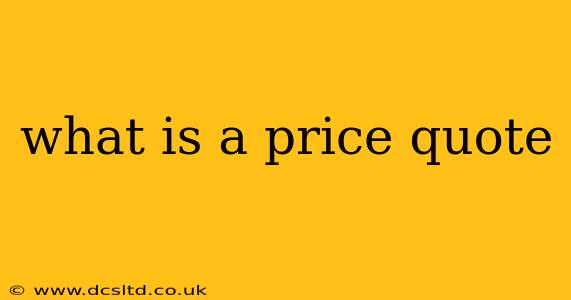A price quote, also known as a quotation or estimate, is a formal document outlining the cost of goods or services. It's a crucial element in business transactions, providing potential clients with a detailed breakdown of expenses before committing to a purchase or project. This guide will explore what constitutes a price quote, its different types, and how to effectively create and use one.
What Information Should a Price Quote Include?
A well-structured price quote should contain the following key elements:
- Company Information: Your company's name, address, phone number, email, and website. This establishes your business identity and makes it easy for the client to contact you.
- Quote Date: The date the quote was issued. This is crucial for tracking and managing quotes over time.
- Quote Number: A unique identifier for the quote, facilitating easy reference and organization.
- Client Information: The name and contact information of the client receiving the quote. Accurate information prevents delays and misunderstandings.
- Description of Goods or Services: A clear and detailed description of the items or services offered. Avoid ambiguity; use precise language and measurements.
- Pricing: A detailed breakdown of costs, including unit prices, quantities, and any applicable taxes. Be transparent about all charges.
- Payment Terms: Specify accepted payment methods, deadlines for payment, and any applicable discounts or penalties.
- Validity Period: State how long the quote remains valid. Prices can fluctuate, so set a reasonable timeframe.
- Shipping and Handling (if applicable): Clearly outline shipping costs, delivery times, and any associated fees.
- Terms and Conditions: Include any relevant terms and conditions, such as cancellation policies, warranties, or liability limitations. This protects both you and the client.
- Contact Person: Include the name and contact information of the person the client can reach for questions or clarifications.
Different Types of Price Quotes
Several types of price quotes cater to different situations and needs:
- Fixed-Price Quote: This quote sets a fixed price for goods or services, regardless of unforeseen circumstances (unless explicitly stated otherwise). It's ideal for projects with well-defined scopes.
- Time and Materials Quote: This quote charges for both labor hours and materials used. It's suitable for projects with uncertain scopes or those requiring significant customization.
- Unit Price Quote: This quote provides a price per unit, allowing clients to adjust the quantity as needed. It's commonly used for standardized products.
- Estimate Quote: This quote provides an approximation of the cost, often used when the project scope is still unclear. It's important to clearly state that it's an estimate and may be subject to change.
What's the Difference Between a Quote and an Invoice?
While both relate to the cost of goods or services, a quote is a proposal for the cost before the work begins, while an invoice is a bill sent after the goods or services have been provided. A quote is an offer, and an invoice is a request for payment.
How to Create an Effective Price Quote
Creating a professional and clear price quote is vital for building trust and securing clients. Use a template for consistency, and always double-check for accuracy before sending it. Consider using quote management software for efficiency.
How Long is a Price Quote Valid For?
The validity period of a price quote varies depending on the industry and the nature of the goods or services. It's crucial to specify the validity period clearly within the quote itself. Typical validity periods range from a few days to a few weeks or even months for larger projects. However, always consider market fluctuations and communicate clearly if pricing is likely to change.
What Happens If a Price Quote Expires?
Once a price quote expires, it's no longer a valid offer. The seller is not obligated to honor the quoted price. A new quote must be issued with updated pricing and terms, reflecting the current market conditions.
By understanding the intricacies of price quotes and following best practices, businesses can create professional, clear, and effective documents that contribute to successful transactions and build strong client relationships.
